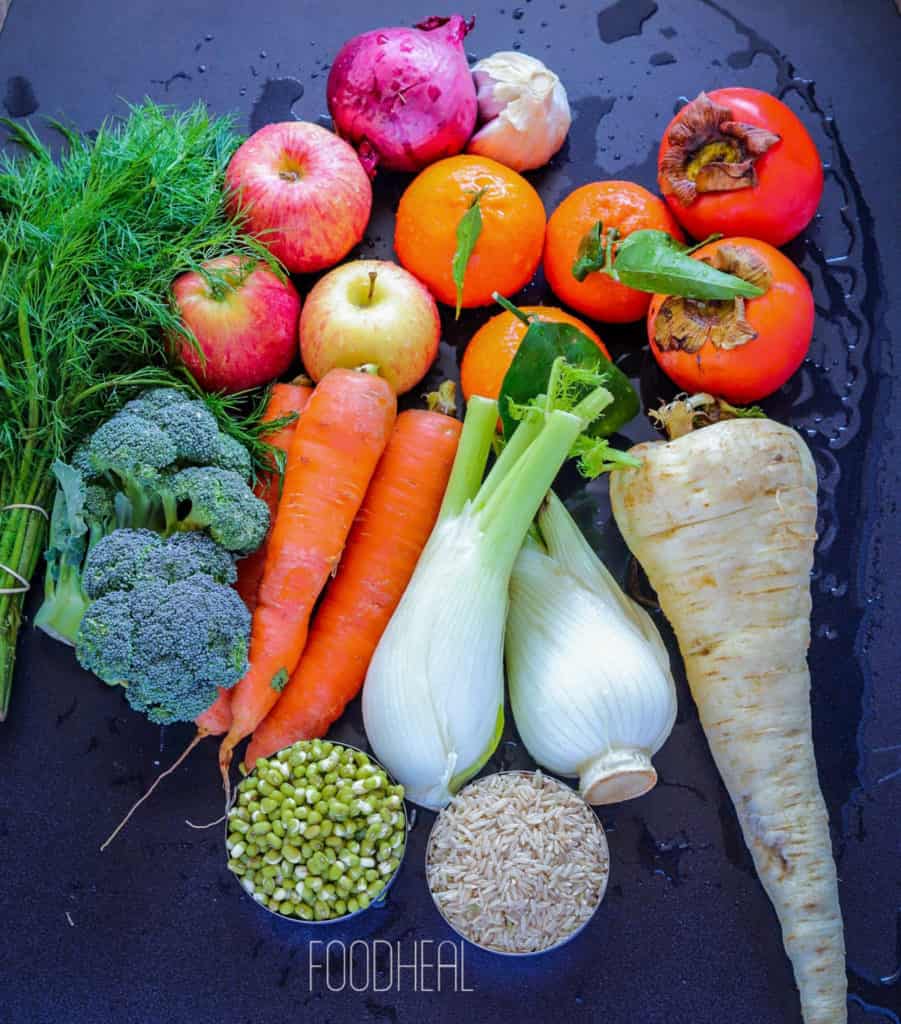Some foods have been found to cause inflammation in the body. These include processed foods, refined sugars, saturated and trans fats, and foods high in gluten and dairy. Eating too much of these foods can lead to chronic inflammation, which is linked to various health problems, including heart disease, diabetes, obesity, cognitive disorders, and auto-immune diseases. Continue reading to learn how to reduce inflammation.

Is your food the cause of your inflammation? Reducing inflammatory foods can be the best and easiest way to reduce inflammation.
Do you like your food spicy, oily, caramelized, or food cooked for hours in that mmm yummy sauce? Or you're a rainbow eater, a vegetable juicer, or a raw food lover?
The food you eat will either cause inflammation or help you combat inflammation in your body. How?
- Your food will help your body by feeding you with nutrients and also feeding your microbiome that will digest your indigested part of that food. The byproduct of that digestion will feed your cells, which will produce energy that your body needs. Thus increasing your overall health.
- Your diet containing too much sugar, fat, and processed food will overwork your body and harm your intestinal lining, which may cause inflammation. These types of food will promote the growth of an unfriendly microbiome. This microbiome will, in turn, feast on your undigested food, which will make them proliferate in your gut. This will promote inflammation, making you sick, overweight, etc.
How does food cause inflammation?
The food you consume plays an important role in your body. And sometimes, it can cause inflammation. The digestive microbiome releases chemicals that may promote or suppress inflammation. The type of intestinal microbiome that populates your gut contributes to your health through the biosynthesis of vitamins and essential amino acids.
Your microbiome also, through fermentation generates important byproducts from your undigested food(fiber); like Short Chain Fatty Acids (SCFA), vitamin K, and B. SCFA vary according to the food you eat.
SCFAs Butyrate and Propionate play a role in regulating your immune system and controlling intestinal inflammation.
Acetate, another SCFA, is a major energy source for your intestinal wall cells. They contribute to strengthening your intestinal barrier.
The main source of SCFA are carbohydrates; therefore, a diet of high fiber, adequate healthy fat, low sugar, and less meat is the optimum.
However, a diet of low fiber and high in unhealthy fats, sugar, and processed food will produce less SCFA. Since this diet will promote the growth of unfriendly bacteria, it will hence cause or exacerbate inflammation leading to more complex health issues.
Foods that cause inflammation
- Diets that are high in sugar, refined starches, and trans fat cause inflammation.
- Food cooked in high temperatures, chemical preservatives, and unnatural ingredients will cause inflammation.
Sugar
It's referred to as white 'death'. Unfortunately, sugar is almost in every processed and packed cooked food you can get out there!
Sugar can be considered addictive; the more you eat food that has sugar the more you want to eat again. The food industry has known how to play this trick on people by adding sugar to food. The more you consume that kind of food, the more you buy, and the more money they make.
High sugar intake reduces immune system cell activities due to the lack of vitamin C.
Additionally, cancer cells can easily synthesize carbohydrates for themselves by using glucose and fructose. Therefore, sugar promotes cancer and weakens the immune system.
High glucose promotes pro-inflammation cytokines (cytokines are small proteins produced by cells to facilitate communication among cells).
Animal products
Meat, processed or non-processed, is associated with high CPR (high-sensitivity C-reactive protein).
High consumption of red meat and high proteins are suggested to increase the risk of inflammation in polyarthritis.
A study performed on mice showed that methionine in red meat, pork, and lamb can cause heart dysfunction by increasing oxidative stress and inflammation.
AGEs
Advanced Glycation End products (AGEs) or Glocotoxins, are created through the reaction between reducing sugar and free amino acids of proteins, lipids, or nucleic acid during the cooking process.
This reaction is known as Maillard; you know, that brown-caramelized color that makes you salivate on bread, biscuits, cakes, and meat? It's this chemical reaction that browns food during cooking at high temperatures.
You already have
Read more about AGEs in this article
Though AGES are high in fat per gram, the meat will contribute to more intake since it's served in larger quantities than fat.
Grilling, broiling, frying, roasting, and baking propagate and accelerate the formation of new AGEs.
When high levels of AGEs reach into body tissues and/or circulatory systems, they become pathogenic. These pathogenic effects are known to have the ability to promote Oxidative Stress and cause inflammation. AGEs bind to the cell surface or cross-link with body proteins altering their structures and functions.
Avoiding AGEs in food will help delay chronic diseases and aging. Eating a plant-based diet is one way of reducing AGEs, as carbohydrates contain low AGEs due to high water content and the presence of vitamins and antioxidants.
Nevertheless, you should avoid cooking them in high temperatures to avoid the formation of AGEs.
Trans Fats
Trans fats are found in food originate from animals and are also found in partially hydrogenated vegetable oils.
Take note; partially hydrogenated oils contain transfats while fully hydrogenated oils don't.
Hydrogenated means adding more hydrogen in oils altering their chemical structure. This prevents rancidity and prolongs oils' shelf life. This process transforms the oils into saturated fat, which is not good for your health.
A lot of processed foods and a lot of fried foods have trans fats in them. Some dairy and meat foods have trans fats (naturally present) but in a small amount.
Margarine, shortening, and butter
Heating Vegetable Oils Create Harmful Oxidation Byproducts!
High-temperatures like stir-frying and deep-frying can cause the formation of trans fat in oils through oxidation. The higher the temperature accelerates the reaction rates of oxidation, the more trans fat is generated.
Excessive trans fats in your food may cause inflammation. As a result, increasing a significant risk factor for cardiovascular disease, stroke, and other chronic conditions.
Trans fats promote the risk of developing cancer. They contribute to insulin resistance, which increases the risk of developing type 2 diabetes.
Grains and lectins
The most modified and processed grains are wheat and corn, which can cause some health issues.
Gluten from wheat is the most studied due to it's known to
We, humans, don't have enzymes to completely break down gluten into amino acids.
According to Dr. FASANO, Gluten will increase intestinal permeability in everybody, but this, however, doesn't mean that everyone will have health issues related to gluten.
Nevertheless, intestinal permeability may lead to other diseases like liver; When toxins get into the bloodstream through the leaky gut, the toxins might cause inflammation in your liver during the blood purification.
Lectin is found in all foods. Unless you have an allergy of a given type of food, you can't be allergic to all food, can you? Then please don't board the anti-lectin wagon.
Whole grains are beneficial to your health, and they actually don't cause inflammation but rather reduce it. Include them in your food by reducing the processed grains.
Omega 6
A high intake of omega-6 harms your health as it can lead to chronic inflammation, which is associated with stroke and heart disease, among others.
However, our body needs some omega-6; the problem arises when you consume too much and do not have an adequate intake of omega-3.
You need to balance higher omega-3 and lower omega-6 to maintain optimal health.

To sum up
The role of food is to provide you with enough macro and micro-nutrients to fulfill daily requirements and well being. I feel like saying: the role of food is to help you fight inflammation, especially when you're dealing with chronic inflammation! Limiting the food that can cause inflammation is the best thing you can do for your health.
There's no magic bullet when it comes to food sensitivity in chronic inflammation or auto-immune diseases. As you'll find in the article Microbiome, we all have a unique microbiome. This will determine how you break down the food you eat.
However, optimizing for healthy food will obviously help you alleviate some inflammation and also improve your general health.
Personally, I've found improving my diet has been a game changer in dealing with rheumatoid arthritis since I stopped taking medication. I avoid foods that cause inflammation as much as I can (but I've also realized after years that, for me, even the healthiest foods cause inflammation, like raw cacao and some grains).
I hope you'll find this content helpful and improve your eating habits to help yourself reduce inflammation, as that is my sole goal. Leave a comment to help others as well.
You've got the power to heal yourself, Githu.
I'm passionate about helping women fight chronic diseases. It's a cause close to my heart because I've seen firsthand the impact that illnesses like rheumatoid arthritis, diabetes, heart disease, and cancer can have on women and their families. By empowering women with knowledge and support, I want to make a difference in the fight against chronic diseases and improve the quality of life for women everywhere. Contact me to learn about my coaching services.
Resource
-EJC....https://www.nature.com/articles/s41430-017-0009-6
-Oxford Academic....https://academic.oup.com/jn/article/147/1/78/4630424?searchresult=1
- Mind Body Green....https://www.mindbodygreen.com/0-14098/7-scary-ways-meat-is-messing-up-your-body.html
-PMC....https://www.ncbi.nlm.nih.gov/pmc/articles/PMC4424767/
-Root Cause Medical Clinic..https://rootcausemedicalclinic.com/blog/is-gluten-damaging-your-liver/...
-Havard Medical School..https://www.health.harvard.edu/healthy-eating/fighting-inflammation-at-the-meal-table...
-The Lectin Report...http://www.krispin.com/lectin.html


















D'Ann Walley
There was an ad on here for enzymes that my mom saw. Can you tell me what it was?
Githu
Hi D'Ann, It's my pleasure that you visited my blog, I really do thank you. However, Google Ads are targeted to individuals, so each person gets their own Ads. Further more, I've no control on the Ads on my blog, that's Google's responsibility. I am sorry not being in a position to help you. But if you keep coming on the blog, you might see the same Ads again.
Kissing you the best of time over there.
Githu.